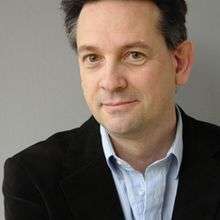Martin Freer
Martin Freer is a British Nuclear Physicist, professor, and was previously head of the School of Physics and Astronomy[1] at the University of Birmingham.[1] He won the 2010 Rutherford Medal and Prize for establishing the existence of nuclear configurations analogous to molecules.[2]

Education
BSc (Hons) Maths and Physics, Aston University, 1987.[1]
PhD in Nuclear Physics, University of Birmingham, 1991.[1]
University of Birmingham
From 2015 until 1st July 2019, Martin Freer was the head of the School of Physics and Astronomy at the University of Birmingham.[1]
He is also the director of the Birmingham Centre for Nuclear Education and Research,[3] whose purpose is to provide the investment and infrastructure to grow the nuclear expertise and capacity in Birmingham,[4] as well as the Director of the Birmingham Energy Institute[5] which seeks to develop sustainable energy solutions in transport, electricity and heat supply.
He featured in the Universities Birmingham Heroes campaign for "championing UK investment in clean-cold technologies amid concern that global demand for cooling and refrigeration will overtake heating by 2060."[6]
Works
- Hans O. U. Fynbo, Martin Freer, "Viewpoint: Rotations of the Hoyle State in Carbon-12", Physics 4, 94 (2011) | doi:10.1103/Physics.4.94
References
- "Professor Martin Freer, School of Physics and Astronomy - University of Birmingham". www.birmingham.ac.uk.
- "2010 Rutherford medal and prize". www.iop.org.
- "Martin Freer, Professor of Nuclear Physics". www.np.ph.bham.ac.uk.
- "About Us - Birmingham Centre for Nuclear Education and Research - University of Birmingham". www.birmingham.ac.uk.
- "Birmingham Energy Institute". www.birmingham.ac.uk.
- "Energy Crisis". www.birmingham.ac.uk.